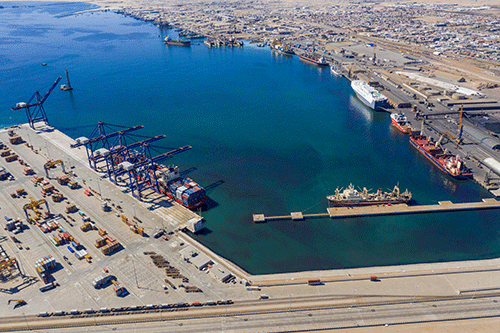Namibia believes and anticipates significant opportunities will emanate from the implementation of the African Continental Free Trade Area (AfCFTA), which in turn will lead to the positive transformation of many economies on the continent.
Some of these opportunities include, larger market access, improved competitiveness and enhanced investment in the country, improved production capacities, improved living standards and increased employment creation.
This is according to trade and industry minister, Lucia Iipumbu, who yesterday launched Namibia’s national strategy for the implementation of AfCFTA.
“To fast-track the implementation of the AfCFTA, the development of an implementation strategy is critical as it leverages deeper integration within the framework of AfCFTA to facilitate an expansion of Namibia’s trade and investment in Africa. In this regard, the ministry of industrialisation has developed its national AfCFTA implementation strategies and action plans. The national strategy has identified key value addition and trade opportunities and constraints, measures and capacities required for it to take full advantage of national, regional and global markets within the context of the AfCFTA,” said Iipumbu at yesterday’s launch.
The minister explained the strategy is informed by Namibia’s broader national development policy frameworks and builds on progress achieved through participation in regional integration initiatives, mainly the Southern African Development Community (SADC) and the Southern African Customs Union (SACU).
It sets in motion the process of identifying and catalysing key value addition and trade opportunities based on Namibia’s comparative and competitive advantage.
Iipumbu noted the strategy further recognises the importance of promoting access of women, youth and small and medium enterprises (MSMEs) to AfCFTA opportunities through the provision of critical entry points into regional and continental markets. It also entails skills development, access to finance and market information, and building export readiness as well as enhancing competitiveness.
“To this end, the strategy will enable Namibia, particularly traders, investors and economic operators, to tap into the opportunities provided by the agreement through its effective implementation, focusing on regulatory adaptation, institutional coordination and capacity building; as well as addressing critical trade and supply-side constraints,” Iipumbu added.
Besides the implementation plan, Namibia has several initiatives underway to optimise the opportunities presented by the continental free trade agenda. These include finalisation of the trade policy framework, which includes both trade in goods and services, finalisation of the Investment and Promotion Act to provide certainty and a framework for both domestic and international investors as well as finalisation of the Informal Economy Policy, particularly in light of the fact that women are a predominant demographic.
“Allow me to encourage the business sector to use this immense opportunity and take advantage of the huge African market while appealing further for our close collaboration between the public and the private sector. Government is committed and will continue to streamline policies and legislations to ease trade and grow our economy for the benefit of all our citizens,” said Iipumbu.
Also speaking at yesterday’s launch, Director for the United Nations Economic Commission for Africa (UNECA) sub regional office for Southern Africa, Eunice Kamwendo, said the national strategy will be the framework that will enable stakeholders in Namibia to fully internalise and maximise opportunities from the larger continental market.
“It is highly commendable that the strategy was formulated through widespread consultations with a broad range of public and private stakeholders and academia. It is these kinds of partnerships across all stakeholder groups which will anchor success in the implementation of the AfCFTA and thereby ensure that benefits from participation in the larger African market accrue to all,” said Kamwendo.
She added that this new AfCFTA strategy will also surely complement current efforts to update Namibia’s trade in goods and services policies and strategies, thereby advancing a coherent, coordinated and aligned trade policy framework.
“ECA (Economic Commission for Africa) recognises that the development of national implementation strategies is critical in creating the soft infrastructure necessary for driving the AfCFTA and for tracking its progress and delivery of benefits to stakeholders across the continent. A staged approach to implementing prioritised actions will put Namibia in the best position to fully achieve its potential for increasing its share of Africa trade and enhance its competitiveness,” said Kamwendo.
– ebrandt@nepc.com.na


